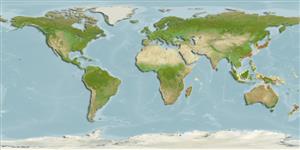>
Gobiiformes (Gobies) >
Gobiidae (Gobies) > Gobiinae
Etymology: Caffrogobius: Arabic kafir = to be unbelieving; infidel, a word given by Arabs to all non moslems and also the region of Caffraria in South Africa (Ref. 45335).
More on author: Boulenger.
Environment: milieu / climate zone / depth range / distribution range
Ecología
marino; salobre demersal. Subtropical
Distribución
Países | Áreas FAO | Ecosistemas | Ocurrencias, apariciones | Point map | Introducciones | Faunafri
Western Indian Ocean and Southeast Atlantic: Mozambique Island to Table Bay, South Africa.
Length at first maturity / Tamaño / Peso / Age
Maturity: Lm 5.0 range ? - ? cm
Max length : 15.0 cm TL macho / no sexado; (Ref. 4343)
Espinas dorsales (total) : 7; Radios blandos dorsales (total) : 11 - 12; Espinas anales: 1; Radios blandos anales: 9 - 10. Body with thin dark bars; pectoral base dusky (Ref. 2798).
Epibenthic, intertidal in pools, sometimes in mud (Ref. 4343).
Life cycle and mating behavior
Maturities | Reproducción | Spawnings | Egg(s) | Fecundities | Larva
Goren, M., 1996. A review of the southern African gobiid fish genus Caffrogobius Smitt, 1900. Spec. Publ. Smith Inst. Ichthyol. (57):1-28. (Ref. 12725)
IUCN Red List Status (Ref. 130435)
Threat to humans
Harmless
Human uses
Herramientas
Special reports
Download XML
Fuentes de Internet
Estimates based on models
Preferred temperature (Ref.
123201): 18.3 - 28.8, mean 27 °C (based on 644 cells).
Phylogenetic diversity index (Ref.
82804): PD
50 = 0.5078 [Uniqueness, from 0.5 = low to 2.0 = high].
Bayesian length-weight: a=0.00912 (0.00503 - 0.01655), b=3.13 (2.98 - 3.28), in cm total length, based on LWR estimates for this species & (Sub)family-body (Ref.
93245).
Nivel trófico (Ref.
69278): 3.6 ±0.3 se; based on diet studies.
Resiliencia (Ref.
120179): Alto, población duplicada en un tiempo mínimo inferior a 15 meses (Preliminary K or Fecundity.).
Fishing Vulnerability (Ref.
59153): Low vulnerability (10 of 100).
